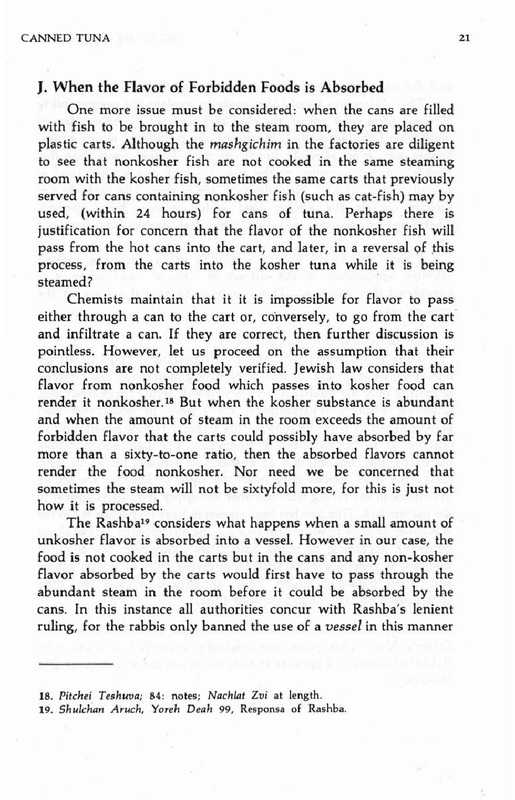Industrial Boilers
|
HaRav H Schachter has declared that the Halacha regarding taste transfer is to be determined by our own experiences and expertise. He writes
Chemists maintain that it is impossible for [non-Kosher] flavour to pass through a sealed can. If they are correct, then further discussion [regarding Kosher] is pointless. click image to enlarge |
Taste Permeates Sealed Tins
A 20 litre pot of boiling pure fresh water will become non-K if a half Kilo sealed metal tin of non-K food is tossed into it. Halacha understands that the non-K flavour is leached out of the sealed tin and taints the water. If that tin is subsequently removed and a half Kilo sealed tin of Kosher food is tossed into that boiling cauldron, the sealed tin of Kosher food becomes non-Kosher. Halacha understands that the flavour of the non-K water will penetrate and taint the Kosher food in the second tin. The non-K flavour taints not only the water but also the pot itself. Thus, if that 20 litre pot is emptied, refilled with clean fresh water and reheated, the non-K flavour it has absorbed will be leached out of the walls of the pot, into the water and from the water into any sealed tin of Kosher food heated in that water. Food Manufacturing Plants A parallel situation exists in many commercial facilities where one boiler supplies the entire plant and that water is recovered and reused. If the plant produces just one non-Kosher product the boiler water becomes non-K and all foods heated with that water become non-K. To prevent the water becoming non-Kosher, the water must be tainted with an unpleasant taste. Boilers that have become tainted with non-K are a significant obstacle in producing Kosher foods. Many foods that might otherwise be Kosher are disqualified through the non-K boiler. However, it must be borne in mind that all industrial boilers are maintained with various unpleasant tasting proprietary chemicals in order to prevent or reduce corrosion, sludge and mineral deposits which reduce the efficiency of the heat exchangers. This is a matter of ordinary maintenance. Why is this relevant? Halacha deems the flavour that has been leached in this fashion to be a "weak" flavour which is treated with leniency. Therefore, if the water has an unpleasant tasting component added to it, it will not disqualify the tins of food cooked in it. Accordingly we should not assume that foods are contaminated through a non-K boiler since in all likelihood it has various foul tasting chemicals added to it. However, some Kosher agencies have a different perspective. Quoted from an article submitted to a Jewish magazine by a well known Kosher organisation: “For example cooking with an open flame [is not the best option in commercial industrial settings. rather]…. A steam jacket is used ……… but the same [steam] system may be connected to non-Kosher vessels throughout the factory bringing the taste from the non-Kosher to the Kosher. One solution is to inject something bitter into the steam to make it taste bad. But many companies won’t allow this, claiming that it may ruin the product. This protest only strengthens the Halachic viewpoint that steam contact between Kosher and non-Kosher vessels can affect the taste.” Our experience and research however, indicates that the reluctance to add those chemicals requested by some Kosher agencies, stems from their concern that any chemical not authorised by the manufacturers of the boilers will void the boiler's warranty and must be suspected of ruining the boiler, a most expensive piece of equipment. Additionally boiler down-time severely interferes with production that few, if any manufacturers can afford. Unsubstantiated Claims We have not heard from any manufacturer or food scientist that additives to the boiler water could taint foods being manufactured. In fact, they scoff at the notion, arguing that their concerns for food quality and taste would compel them to abandon using a common boiler even at the smallest suspicion of such contamination. As far as the manufacturers are concerned, these chemicals pose absolutely no threat to the taste or quality of the food. They are isolated behind non permeable steel pipes designed to meet the highest food quality standards and do not contaminate the food in any way whatsoever. The one and only concern of the manufacturers is that introducing new chemicals to the system may cause a chemical imbalance that will corrode seals or pit metal and interfere with the de-scaling properties of the proprietary de-scalers they have been successfully using for many years. If anyone would offer a money backed guarantee that there will be no such problems they would be more than happy to comply. |



